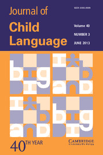
JOURNAL OF CHILD LANGUAGE
Scope & Guideline
Illuminating the Pathways of Language Learning in Children
Introduction
Aims and Scopes
- Language Acquisition Processes:
The journal emphasizes research on how children acquire language, including studies that examine the mechanisms behind vocabulary development, syntactic understanding, and phonological processing. - Bilingualism and Multilingualism:
A significant area of focus is on bilingual and multilingual language acquisition, investigating how children learn and process multiple languages and the effects of language exposure on cognitive and linguistic outcomes. - Child-Parent Interaction:
The journal often features studies on the dynamics of parent-child interactions, particularly how these interactions influence language development through shared reading, conversational engagement, and language input. - Cognitive and Social Influences:
Research exploring the cognitive and social factors that impact language development is prevalent, including the role of socio-economic status, emotional cues, and social engagement in language learning. - Developmental Language Disorders:
The journal addresses issues related to developmental language disorders, focusing on how these disorders manifest in children and their implications for language acquisition and intervention strategies. - Cross-Linguistic Studies:
Studies that involve cross-linguistic comparisons are common, providing insights into how language acquisition may vary across different linguistic and cultural contexts.
Trending and Emerging
- Impact of Technology on Language Development:
Recent studies are increasingly examining how technology, such as screen time and digital interactions, influences language acquisition in children, particularly in the context of the COVID-19 pandemic. - Multimodal Learning Approaches:
There is a growing interest in multimodal approaches to language learning, integrating visual, auditory, and kinesthetic inputs, and how these methods can enhance language acquisition in diverse learning environments. - Neuroscientific Perspectives:
Emerging research utilizing neuroimaging and electrophysiological methods is providing new insights into the neural correlates of language processing in children, marking a trend towards interdisciplinary approaches. - Focus on Pragmatics and Social Communication:
An increasing number of studies are emphasizing the importance of pragmatic skills and social communication in language development, reflecting a broader understanding of language use beyond mere syntax and vocabulary. - Effects of Socioeconomic and Cultural Contexts:
Research that explores how socioeconomic status and cultural contexts affect language development is gaining traction, highlighting the need for context-sensitive approaches to studying child language.
Declining or Waning
- Traditional Phonological Studies:
Research focused solely on basic phonological development without considering contextual or interactive factors has decreased, reflecting a shift towards more integrated approaches that consider social and cognitive influences. - Narrowly Defined Syntactic Structures:
Studies that examine very specific syntactic structures in isolation, without broader contextual analysis, are becoming less common as researchers increasingly adopt more holistic views on language acquisition. - Static Models of Language Development:
There has been a noticeable decline in the publication of studies that rely on static models of language development. The trend is moving towards dynamic and interactive models that account for variability in children's language experiences. - Overly Simplistic Measures of Language Proficiency:
Research utilizing overly simplistic measures of language proficiency, such as basic vocabulary tests without consideration of contextual factors, is waning as there is a growing recognition of the complexity of language use.
Similar Journals
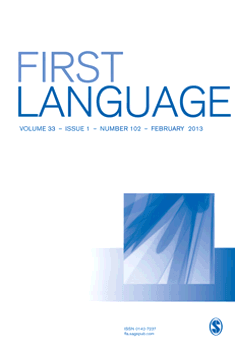
First Language
Illuminating the Pathways of Language LearningFirst Language is a prestigious journal dedicated to the study of language acquisition, development, and use, published by SAGE Publications Ltd. With an ISSN of 0142-7237 and E-ISSN 1740-2344, this journal has been a vital resource in the fields of Education and Linguistics since its inception in 1980. It proudly holds a 2023 Q1 ranking in Linguistics and Language and a Q2 ranking in Education, underscoring its significant impact and contribution to these dynamic fields. Positioned in the 91st and 90th percentiles in Scopus rankings for Language and Linguistics and Social Sciences, respectively, First Language attracts a global readership, fostering rigorous scholarly discussion and exploration. The journal is not Open Access, ensuring that its curated content maintains a high level of academic integrity and exclusivity. With a rich historical scope extending to 2024, First Language serves as an essential platform for researchers, practitioners, and students committed to advancing our understanding of language in all its complexities.
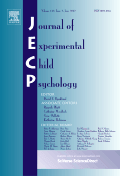
JOURNAL OF EXPERIMENTAL CHILD PSYCHOLOGY
Advancing the Frontiers of Child Psychology ResearchJOURNAL OF EXPERIMENTAL CHILD PSYCHOLOGY, published by Elsevier Science Inc, stands as a premier outlet for high-quality research in the fields of Developmental and Educational Psychology and Experimental and Cognitive Psychology. With an impressive impact factor and recognized within the Q1 category for both developmental and experimental psychology, this journal is dedicated to advancing our understanding of child psychology through rigorous empirical research and theoretical contributions. Indexed with an ISSN of 0022-0965 and E-ISSN 1096-0457, it is a vital resource for scholars aiming to explore the complexities of children's cognitive, social, and emotional development from 1964 to 2024. Engaging with this journal provides researchers, professionals, and students access to cutting-edge findings that inform practice, policy, and future studies in the ever-evolving landscape of child psychology.

Annual Review of Linguistics
Synthesizing Knowledge for Tomorrow's LinguistsAnnual Review of Linguistics is a premier scholarly journal dedicated to advancing the field of linguistics through comprehensive and insightful reviews of current research and emerging trends. Published by ANNUAL REVIEWS, this journal is recognized for its high impact, evidenced by its Q1 ranking in the Linguistics and Language category and exceptional placements in the Scopus Ranks, positioning it in the top 2% of its field. Since its inception in 2015, the journal has served as a vital resource for researchers, professionals, and students seeking to deepen their understanding of language theories, acquisition, processing, and sociolinguistics. With no Open Access currently available, the Annual Review of Linguistics is esteemed for its rigorous peer-reviewed articles that synthesize a wealth of knowledge, making it an indispensable tool for advancing research and dialogue within the linguistic community.
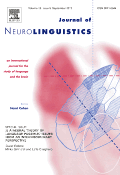
JOURNAL OF NEUROLINGUISTICS
Advancing Insights at the Intersection of Language and BrainJOURNAL OF NEUROLINGUISTICS, published by Pergamon-Elsevier Science Ltd, is a premier academic journal that rigorously explores the intersection of language and the brain, emphasizing the cognitive and neurological underpinnings of linguistic processes. With an ISSN of 0911-6044 and an E-ISSN of 1873-8052, this journal has established itself as a crucial resource for researchers, professionals, and students in the fields of linguistics, cognitive neuroscience, and psychology. Boasting an impressive Q1 classification in Linguistics and Language and Arts and Humanities (miscellaneous) for 2023, the journal demonstrates significant impact, having achieved a ranking within the 91st percentile in Linguistics and Language according to Scopus rankings. The scope of the journal spans comprehensive studies from 1985 to 2025, reflecting a long-standing commitment to advancing the understanding of how language interacts with human cognition. Although it does not currently offer open access, its relevance extends well beyond its articles, contributing to ongoing scholarly dialogues and fostering new insights in the study of neurolinguistics.
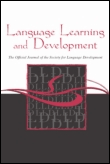
Language Learning and Development
Exploring innovative methodologies for effective language learning.Language Learning and Development, published by Routledge Journals, Taylor & Francis Ltd, is a premier academic journal that stands at the forefront of research in the fields of education and linguistics. With a robust ISSN of 1547-5441 and E-ISSN 1547-3341, this journal not only boasts an impressive Q1 classification in both Education and Linguistics for 2023 but also ranks favorably in Scopus metrics, highlighting its significance in advancing scholarship. Situated in the United Kingdom, it focuses on the intersection of language acquisition, cognitive development, and pedagogical practices, making it an essential resource for researchers, educators, and students alike. Given its commitment to publishing rigorous research articles, Language Learning and Development aims to foster dialogue and explore innovative methodologies in language learning, providing an invaluable platform for contemporary issues and advancements in this dynamic field.
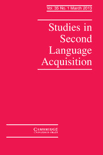
STUDIES IN SECOND LANGUAGE ACQUISITION
Navigating the evolving landscape of second language studies.STUDIES IN SECOND LANGUAGE ACQUISITION, published by Cambridge University Press, is a premier journal dedicated to advancing the field of second language acquisition. With an ISSN of 0272-2631 and an E-ISSN of 1470-1545, this journal has carved its niche as a leading resource for scholars and practitioners alike since 1978. Recognized in Q1 quartiles across both Education and Linguistics and Language, and ranked within the top 2% in its fields according to Scopus, it provides a platform for cutting-edge research that addresses the complexities of language learning and teaching. Although it does not currently offer open access, the journal remains widely accessible through institutional subscriptions, ensuring that groundbreaking research reaches a global audience. With a focus on empirical studies, theoretical discussions, and innovative methodologies, STUDIES IN SECOND LANGUAGE ACQUISITION is essential for those seeking to deepen their understanding of language education, making it a must-read for researchers, educators, and students committed to the evolving landscape of language acquisition.

Lingue e Linguaggio
Cultivating a Rich Discourse in Language and LinguisticsLingue e Linguaggio, published by SOC ED IL MULINO, is a distinguished academic journal in the field of Linguistics and Language, hailing from Bologna, Italy. With an esteemed Q2 ranking in its category as of 2023, this journal is recognized for its contributions to both the arts and humanities as well as social sciences, achieving notable positions within Scopus rankings. It serves as a vital platform for researchers, practitioners, and students interested in exploring various linguistic phenomena, language dynamics, and theoretical frameworks. Although it operates under a traditional subscription model rather than open access, its comprehensive array of studies and publications provides significant insights and fosters academic discourse. With a publication period extending from 2002 to 2024, Lingue e Linguaggio continues to be a key resource for advancing the understanding of language in contemporary contexts.

JOURNAL OF PSYCHOLINGUISTIC RESEARCH
Bridging Disciplines to Illuminate Language UnderstandingJOURNAL OF PSYCHOLINGUISTIC RESEARCH is a premier scholarly publication dedicated to the interdisciplinary exploration of language and cognition. Established in 1971 and published by Springer/Plenum Publishers, this journal serves as a vital platform for researchers in Experimental and Cognitive Psychology, Linguistics, and related fields. With an impressive reputation reflected in its 2023 Category Quartiles—Q3 in Experimental and Cognitive Psychology, Q1 in Linguistics and Language, and Q2 in Psychology (miscellaneous)—the journal ranks prominently within the Scopus database, reaching the 88th percentile in Language and Linguistics. Researchers and professionals have the opportunity to disseminate their findings effectively, enriching contemporary understanding of psycholinguistic phenomena through rigorous peer-reviewed articles. Although currently not an open-access journal, it provides extensive access options that cater to a global audience, ensuring that the latest research is readily available to those dedicated to advancing this dynamic field. We invite scholars, practitioners, and students to engage with this essential resource for fresh insights and innovative research methodologies.
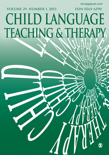
Child Language Teaching & Therapy
Enhancing understanding of child language acquisition and support.Child Language Teaching & Therapy is a premier journal published by SAGE Publications Ltd, dedicated to advancing the field of child language development and intervention. With its ISSN 0265-6590 and E-ISSN 1477-0865, this interdisciplinary journal has been pivotal since its inception in 1985 and continues to set academic standards through 2024. The journal holds a significant reputation within the Q3 quartile categories in Clinical Psychology, Developmental and Educational Psychology, and Education, alongside an esteemed Q1 designation in Linguistics and Language. Its Scopus rankings underscore its influence, particularly in the Arts and Humanities and Social Sciences domains, with remarkable percentiles that reflect its commitment to fostering high-quality research and innovation in child language teaching and therapy. Though not open access, it remains a vital resource for researchers, clinicians, and educators who seek to understand and enhance communication practices among children. By disseminating empirical studies, theoretical discussions, and practical applications, this journal plays a crucial role in bridging the gap between academic inquiry and real-world application, making it an indispensable asset for practitioners and scholars alike.

Neurobiology of Language
Unraveling the mysteries of language through a neurobiological lens.Neurobiology of Language, published by MIT Press, is a premier scholarly journal dedicated to pioneering research at the intersection of linguistics and neuroscience. As part of the prestigious Q1 quartile in both Linguistics and Neurology, this journal not only ranks in the top tier of its fields—placing 41st out of 1167 in Linguistics and 57th out of 192 in Neurology according to Scopus—but also serves as a vital platform for innovative studies that explore the complexities of language from a neurobiological perspective. Though offered under a traditional subscription model, the journal ensures accessibility to groundbreaking research that is crucial for advancing our understanding of how language is processed and represented in the brain. With a focus on works produced between 2020 and 2024, the Neurobiology of Language is committed to disseminating influential and transformative research that shapes the future of cognitive science, language development, and neuropsychology, making it an essential resource for researchers, professionals, and students alike.